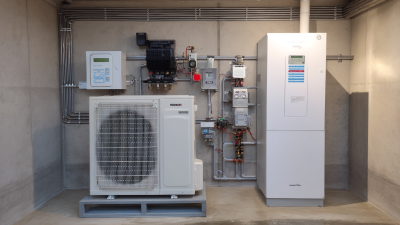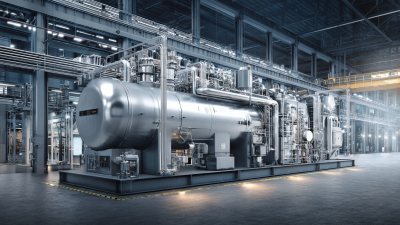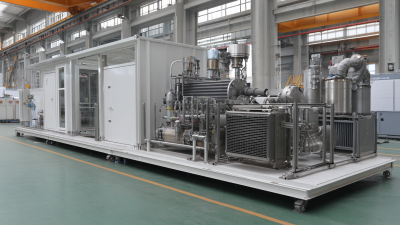Leave Your Message
As we continue to navigate the challenges of climate change and the need for sustainable living, innovative technologies are stepping forward to redefine our daily habits. Among these advancements, Instant Electric Water Heaters are emerging as key players in the quest for energy efficiency and environmental responsibility. These compact systems not only deliver hot water on demand but also promise significant reductions in energy consumption compared to traditional water heating methods.

In this blog, we will explore the future of Instant Electric Water Heaters, examining how they can contribute to a more sustainable lifestyle. We will provide essential tips for consumers looking to make the transition to this eco-friendly solution, while also discussing the technological advancements that are shaping this exciting field. Join us as we delve into the multifaceted benefits and possibilities that Instant Electric Water Heaters hold for both households and the environment.
As we continue to navigate the complex landscape of sustainable living, innovative technologies in instant electric water heaters are playing a pivotal role. According to a recent industry report, the market for instant electric water heaters is projected to grow at a compound annual growth rate (CAGR) of 7% over the next five years, driven by increasing energy efficiency demands and a shift towards sustainable household solutions. These modern heating systems not only provide instant hot water but are also designed with advanced insulation and smart technology features that significantly reduce energy consumption.
The latest advancements presented at CES 2025 showcase remarkable innovations, including AI-driven smart controls that optimize energy use based on user behavior and environmental conditions. These next-generation water heaters are capable of adjusting their heating capacity dynamically, leading to potential energy savings of up to 30% compared to traditional systems. Furthermore, with features such as app connectivity and remote monitoring, consumers can enjoy perfect convenience while contributing to reducing their carbon footprint. The future of water heating is not just about efficiency; it’s about embracing technology that aligns with our commitment to sustainability.
| Feature | Next Generation Model | Current Model | Sustainability Index |
|---|---|---|---|
| Energy Efficiency | 98% | 85% | High |
| Water Heating Speed | 30 seconds | 1 minute | Very High |
| Smart Technology Integration | Yes (IoT-enabled) | No | Medium |
| Durability | 15 years | 10 years | High |
| CO2 Emissions | 0 g/kWh | 50 g/kWh | Very Low |
As the world continues to grapple with climate change and the pressing need for sustainable solutions, switching to instant electric water heaters emerges as a pivotal choice for environmentally conscious consumers. Instant electric water heating systems provide on-demand hot water, which minimizes energy waste by heating only the water you need, when you need it. This efficiency not only reduces energy consumption but also lowers greenhouse gas emissions associated with traditional water heating methods.
The environmental benefits extend beyond energy savings. Instant electric water heaters generally have a smaller carbon footprint than conventional storage heaters, primarily due to their compact design and lower operational energy requirements. Furthermore, they often rely on renewable energy sources such as solar or wind power, enhancing their sustainability profile. By transitioning to these innovative solutions, households can significantly contribute to reducing water heating's overall environmental impact, promoting a more sustainable lifestyle that aligns with global efforts to protect our planet.

The advancement of technologies in water heating systems is a pivotal aspect of enhancing energy efficiency in homes. Next-generation strategies, such as those that integrate phase change materials (PCM) with ground source heat pumps, promise significant improvements in thermal performance, particularly in colder climates. These systems leverage the latent heat storage capabilities of PCM to provide consistent heating, minimizing energy consumption while meeting residential heating demands. As we strive towards sustainable living, such innovations can play a critical role in reducing greenhouse gas emissions associated with heating.
Additionally, the integration of modern materials and engineering technologies can further amplify energy efficiency across various applications, including residential water heating. For instance, innovative approaches can optimize the use of excess water and light in systems, encouraging a more sustainable footprint in greenhouse practices. Meanwhile, techniques aimed at improving energy performances in buildings are essential, as they not only address the growing energy demand spurred by climate and population pressures but also align with global net-zero pathways. Engaging stakeholders effectively and assessing building energy performance can facilitate a transition toward more sustainable residential environments, underscoring the importance of strategic planning in energy efficiency advancements.
The integration of smart home features with instant electric water heaters is revolutionizing sustainable living. According to the International Energy Agency (IEA), buildings account for approximately 36% of global energy use, and optimizing hot water systems can significantly reduce this footprint. Instant electric water heaters not only provide hot water on demand but, when coupled with smart technology, can operate more efficiently by learning user habits and adjusting usage accordingly. This means reduced energy waste and lower utility bills for homeowners.
A report by Navigant Research indicates that the market for smart water heating solutions is expected to grow substantially, with more households adopting technologies like mobile app controls and real-time energy tracking. These innovations allow users to monitor their energy consumption and control heating schedules remotely, promoting a more conscious and responsible approach to energy use. Furthermore, instantaneous heating can reduce the carbon footprint of water heating systems, as they minimize water waste associated with traditional storage tanks. By embracing these smart integrations, we move closer to achieving a sustainable future while enjoying modern conveniences.
This bar chart illustrates the adoption rate of instant electric water heaters over the years, highlighting the growing trend towards sustainable living solutions integrated with smart home features. As awareness of energy efficiency and sustainability increases, the adoption rate has seen a significant upward trajectory.
As we look ahead to the next decade, the landscape of instant electric water heaters is set to undergo significant transformation. One of the most prominent trends is the integration of smart technology. These advanced systems will not only allow users to control their water heating via mobile apps but will also enable predictive analytics. By learning from user habits, these devices can optimize energy consumption, providing hot water when it’s needed most, while minimizing energy waste.

Moreover, sustainability will drive innovation in the industry. Manufacturers are increasingly focusing on energy efficiency, utilizing materials that reduce environmental impact. New models are expected to incorporate heat pump technology, which can decrease energy usage by up to 60% compared to conventional water heating systems. This evolution towards more eco-friendly options aligns with global efforts to combat climate change, making instant water heaters a vital part of sustainable living in the coming years.






